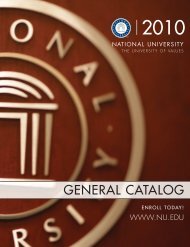Journal of Research in Innovative Teaching - National University
Journal of Research in Innovative Teaching - National University
Journal of Research in Innovative Teaching - National University
You also want an ePaper? Increase the reach of your titles
YUMPU automatically turns print PDFs into web optimized ePapers that Google loves.
Cross-Cultural Awareness<br />
One <strong>of</strong> the goals <strong>of</strong> global education is cross-cultural awareness and sensitivity. As Roux (2001)<br />
says, students should be aware <strong>of</strong> specificities and similarities <strong>in</strong> other cultures, traditions,<br />
religions, and beliefs different from their own. Students who understands that a different culture<br />
is not necessarily bad, <strong>in</strong>ferior, or superior become more tolerant <strong>of</strong> others. They learn to view<br />
issues from a multidimensional perspective while harness<strong>in</strong>g those issues that cut a cross-cultural<br />
barriers. Psychologists believe that strong cultural misunderstand<strong>in</strong>g and complexes <strong>in</strong>evitably<br />
lead to high levels <strong>of</strong> cultural <strong>in</strong>tolerance, hatred, tribalism, racism, conflicts, violence, and<br />
eventually war and different forms <strong>of</strong> kill<strong>in</strong>g. Multicultural education recogniz<strong>in</strong>g cultural<br />
diversity and these differences common <strong>in</strong> our classrooms today is a good start<strong>in</strong>g po<strong>in</strong>t for such<br />
education (Banks, 2008). This is particularly true <strong>in</strong> many African countries with a plethora <strong>of</strong><br />
tribes <strong>of</strong>ten lead<strong>in</strong>g to tribal tensions, wars, and genocides.<br />
Cross-cultural awareness, therefore, helps correct misunderstand<strong>in</strong>gs <strong>of</strong> different<br />
cultures, fosters cross-cultural cooperation, and forms global citizens who can face everyday<br />
challenges <strong>of</strong> the current society characterized by a culturally diverse, multil<strong>in</strong>gual, and globally<br />
<strong>in</strong>terconnected world (Gay, 2000; Merryfield & Wilson, 2005). It teaches young people to avoid<br />
stereotyp<strong>in</strong>g others and simplify<strong>in</strong>g their cultures. It also helps youths dissipate exotic views <strong>of</strong><br />
themselves and their own cultures and to simply see themselves as part <strong>of</strong> humanity. The<br />
emphasis is on appreciat<strong>in</strong>g beauty <strong>in</strong> diversity <strong>in</strong> the human race by view<strong>in</strong>g the world with a<br />
cultural lens.<br />
Global Issues<br />
Another emphasis <strong>of</strong> a global education is the awareness and understand<strong>in</strong>g <strong>of</strong> burn<strong>in</strong>g issues<br />
and events that may affect or have the potential <strong>of</strong> affect<strong>in</strong>g our own lives and the lives <strong>of</strong> people<br />
around the globe. It is be<strong>in</strong>g aware <strong>of</strong> the state <strong>of</strong> the planet with regard to environmental<br />
protection and susta<strong>in</strong>able development, globalization and world economies, human rights and<br />
social justice, gender and discrim<strong>in</strong>ation, conflict resolution and peace build<strong>in</strong>g, population and<br />
food security, democracy and good governance, health, sanitation and HIV/AIDS, rural<br />
development and poverty reduction, war and natural disasters, uses and misuses <strong>of</strong> ICTs,<br />
volunteer<strong>in</strong>g and community service ,and a host <strong>of</strong> others. Students must therefore not only focus<br />
on knowledge acquisition but also be conscious <strong>of</strong> the state <strong>of</strong> the world (Mansilla & Gardner,<br />
2007). An understand<strong>in</strong>g <strong>of</strong> the nature, causes, or effects <strong>of</strong> any <strong>of</strong> the above at both the<br />
<strong>in</strong>dividual level and that <strong>of</strong> the planet at large leads to a greater commitment to safeguard<strong>in</strong>g the<br />
world and its people and mak<strong>in</strong>g the world a better place to live <strong>in</strong>. Osler (2005) postulates that<br />
such concern will provoke the build<strong>in</strong>g <strong>of</strong> a culture <strong>of</strong> peace and respect <strong>of</strong> the rights and welfare<br />
<strong>of</strong> all.<br />
Knowledge <strong>of</strong> global issues is not only theoretical understand<strong>in</strong>g <strong>of</strong> the above issues but<br />
also draw<strong>in</strong>g <strong>in</strong>spiration from practical life events related to them. For example, the election <strong>of</strong><br />
President Barack Obama provides a unique opportunity for students to draw lessons on racism<br />
and human rights, cross-cultural awareness, honesty and hard work, elections and democracy,<br />
good governance and peace and a host <strong>of</strong> others. Similarly future global citizens must be <strong>in</strong>spired<br />
from other world events and learn to protect the environment, fight for peace and justice, seek<br />
gender equality, use technology for the benefit <strong>of</strong> man, and strive to reduce poverty, war and<br />
diseases.<br />
The understand<strong>in</strong>g <strong>of</strong> global issues thus seeks to br<strong>in</strong>g students to the realization that<br />
anyth<strong>in</strong>g happen<strong>in</strong>g around the world has the potential <strong>of</strong> affect<strong>in</strong>g them directly or <strong>in</strong>directly.<br />
138

















